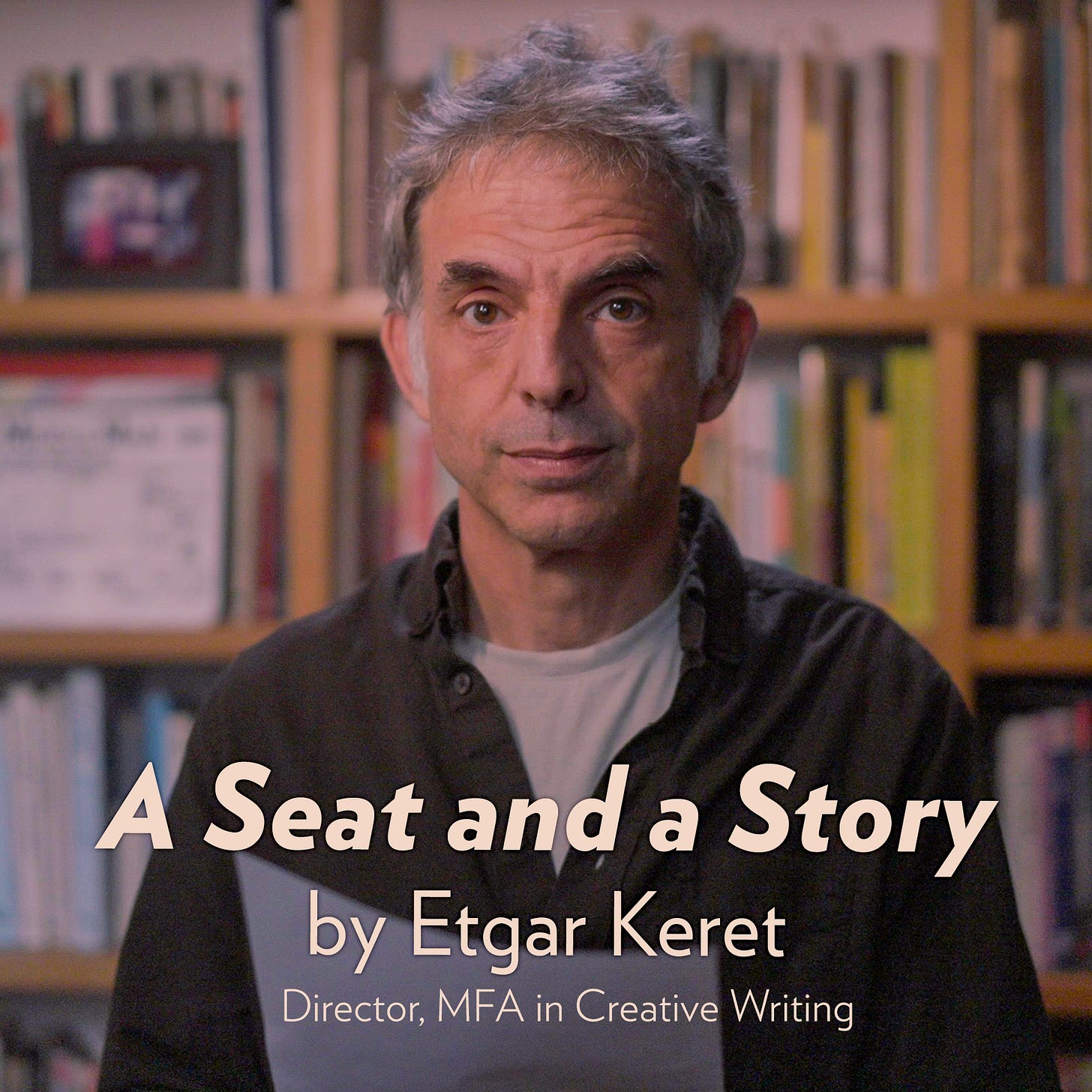I wrote my first story almost forty years ago, and writing has been my routine ever since. There’ve been very few periods in my life when I wasn’t writing and pondering writing on a daily basis. But even though I’m always thinking about writing, up until launching Alphabet Soup, I kept most of those thoughts to myself. The Covid pandemic, followed by the ongoing horrific events of the past couple of years, have reinforced my belief that, without writing – which helps me observe myself and my desires – I would find it difficult to survive and hold on to my freedom.
I’m very excited to announce a new program that I’m founding: a low-residency MFA in creative writing, at the Jewish Theological Seminary (JTS), in New York. This unconventional course of study will help students find ways to tell stories through a variety of media, and have fun while they’re at it. I know this might sound a little ambitious, even for me. But we already have an incredible cadre of writers and other creatives on board. Here is my vision for the program, which begins – of course – with a story about my mother.
When I was about eight years old, my mom took me to the pediatrician. A boy and his mother were sitting in the only two chairs in Dr. Bokokovski’s waiting room. The mother was roughly forty, like mine, and the boy looked around my age. When we walked in, the mother elbowed her son and whispered loudly, “Get up. Go on, get up! She’s a Holocaust survivor.” The boy quickly stood up and offered my mother his seat. It was an awkward moment, but Mom instantly diffused the tension with her radiant smile. “What a polite boy,” she said, “there aren’t many children like you anymore. But let me ask you: why do you want to give me your seat?” “Because you’re a Holocaust survivor,” the boy replied proudly, like a student giving the correct answer. “And what do you think that means, that I’m a Holocaust survivor?” my mother asked curiously. The boy said, “It means that you suffered a lot, that you were tortured, that they killed the people you loved best, and the least I can do to make up for it is give you my seat.”
Mom smiled and shook her head from side to side admiringly. Then she said, “You are such a clever and articulate boy. But in my opinion, the fact that I’m a Holocaust survivor means something completely different. I think that what it means…” – she leaned over to the boy as if she were about to share a secret – “…is that if your mother and you and I stood here in this waiting room for hours and hours and hours, with no food and no water, the two of you would collapse long before I did. And so I’d recommend that you keep your seat, honey. You never know when you might need it.”
I think that was the first time in my life that I encountered the power of storytelling. Because when my mother walked into that waiting room, and that well-bred boy stood up, he wasn’t just offering her a chair to sit on. He was offering her a story. My mother politely refused both things, and made it clear that she had no need for the diminishing tale of victimhood that the boy had obviously heard at school. She could tell her story herself. She could own it.
It’s no wonder that the Jewish people has always had an exceptional gift for telling stories. In the Diaspora, it faced two options: either embrace the local narrative and give up its own identity, or try to create a different story for itself, one that did not abandon its roots and yet was engaged with the time and place in which it lived. For generation after generation, from Hasidic tales to Seinfeldian anecdotes, Jews have made remarkable use of stories to define their individual and communal identities, and to voice the insider/outsider perspective that typified their social status. In such circumstances, storytelling was almost a survival mechanism. I don’t know if the capacity to tell a story was what saved my mother’s life, but I can say beyond a doubt that it did save her soul.
In our current precarious reality, which offers mostly frightening, wearying and demoralizing stories, it seems that the existential need to tell stories is no longer unique to Jews and other immigrant communities trying to preserve their identities in exile. Instead, it has become a fundamental life skill that every person must adopt.
In our writing program at JTS, we will help our students find their unique ways to tell the stories they are compelled to tell. Alongside the option of submitting a fiction or non-fiction manuscript as their thesis, students will be able to choose alternative storytelling formats. They will be supported by a faculty working in a range of genres and a flexible approach that encourages each student to navigate their own storytelling path. Program graduates will be empowered to share their voices in ways that spread beyond traditional audiences, reaching a diverse readership that is just as hungry for a good story.





I think you’ve just about covered the majority of the 613 … Mazal tov, toda, you make this world a better, more thoughtful, beautifully-imaginative, -real and -place. May this initiative be one taken up in other countries, too.🤗
WOW, what a line-up!
At first I thought this was an April Fools joke. Too great to be real!?
Alas, just wish I was more courageous, more accomplished, richer and younger...I would have jumped right in.
All the best to the best of the best!
I look forward to relishing your creations.